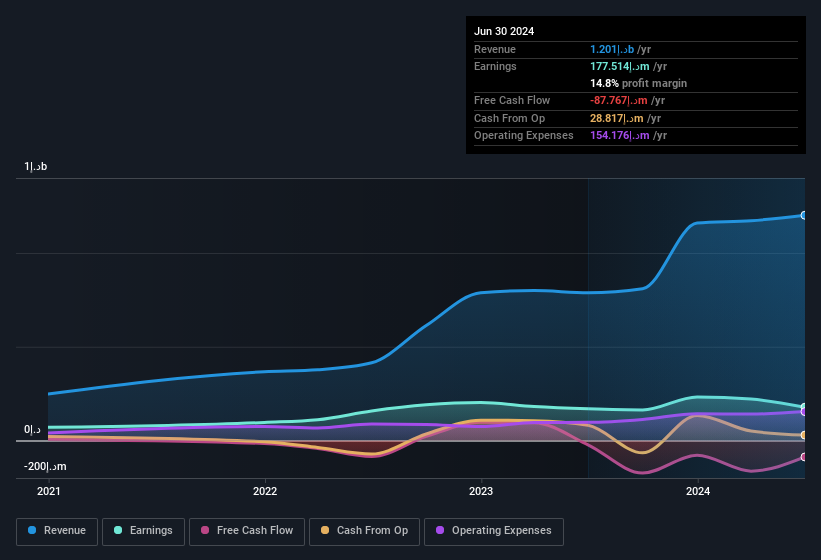- United Arab Emirates
- /
- Telecom Services and Carriers
- /
- ADX:SPACE42
Bayanat AI (ADX:BAYANAT) Strong Profits May Be Masking Some Underlying Issues
Bayanat AI PLC's (ADX:BAYANAT) robust recent earnings didn't do much to move the stock. However the statutory profit number doesn't tell the whole story, and we have found some factors which might be of concern to shareholders.
See our latest analysis for Bayanat AI

Zooming In On Bayanat AI's Earnings
One key financial ratio used to measure how well a company converts its profit to free cash flow (FCF) is the accrual ratio. In plain english, this ratio subtracts FCF from net profit, and divides that number by the company's average operating assets over that period. You could think of the accrual ratio from cashflow as the 'non-FCF profit ratio'.
That means a negative accrual ratio is a good thing, because it shows that the company is bringing in more free cash flow than its profit would suggest. That is not intended to imply we should worry about a positive accrual ratio, but it's worth noting where the accrual ratio is rather high. Notably, there is some academic evidence that suggests that a high accrual ratio is a bad sign for near-term profits, generally speaking.
For the year to June 2024, Bayanat AI had an accrual ratio of 0.41. As a general rule, that bodes poorly for future profitability. To wit, the company did not generate one whit of free cashflow in that time. Even though it reported a profit of د.إ177.5m, a look at free cash flow indicates it actually burnt through د.إ88m in the last year. We also note that Bayanat AI's free cash flow was actually negative last year as well, so we could understand if shareholders were bothered by its outflow of د.إ88m.
Note: we always recommend investors check balance sheet strength. Click here to be taken to our balance sheet analysis of Bayanat AI.
Our Take On Bayanat AI's Profit Performance
As we discussed above, we think Bayanat AI's earnings were not supported by free cash flow, which might concern some investors. As a result, we think it may well be the case that Bayanat AI's underlying earnings power is lower than its statutory profit. In further bad news, its earnings per share decreased in the last year. Of course, we've only just scratched the surface when it comes to analysing its earnings; one could also consider margins, forecast growth, and return on investment, among other factors. If you'd like to know more about Bayanat AI as a business, it's important to be aware of any risks it's facing. For example, Bayanat AI has 2 warning signs (and 1 which is potentially serious) we think you should know about.
This note has only looked at a single factor that sheds light on the nature of Bayanat AI's profit. But there is always more to discover if you are capable of focussing your mind on minutiae. Some people consider a high return on equity to be a good sign of a quality business. So you may wish to see this free collection of companies boasting high return on equity, or this list of stocks with high insider ownership.
New: Manage All Your Stock Portfolios in One Place
We've created the ultimate portfolio companion for stock investors, and it's free.
• Connect an unlimited number of Portfolios and see your total in one currency
• Be alerted to new Warning Signs or Risks via email or mobile
• Track the Fair Value of your stocks
Have feedback on this article? Concerned about the content? Get in touch with us directly. Alternatively, email editorial-team (at) simplywallst.com.
This article by Simply Wall St is general in nature. We provide commentary based on historical data and analyst forecasts only using an unbiased methodology and our articles are not intended to be financial advice. It does not constitute a recommendation to buy or sell any stock, and does not take account of your objectives, or your financial situation. We aim to bring you long-term focused analysis driven by fundamental data. Note that our analysis may not factor in the latest price-sensitive company announcements or qualitative material. Simply Wall St has no position in any stocks mentioned.
About ADX:SPACE42
Space42
Operates as an artificial intelligence (AI) powered SpaceTech company.
Excellent balance sheet with proven track record.
Market Insights
Community Narratives



